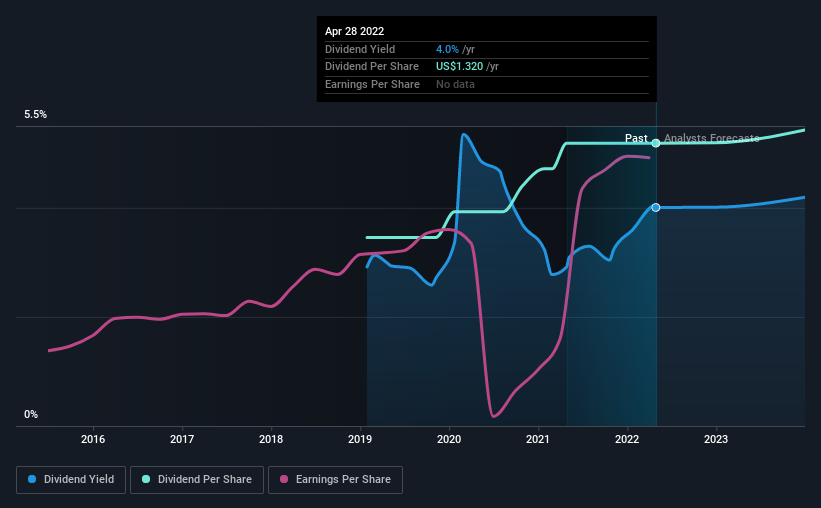
The board of Pacific Premier Bancorp, Inc. (NASDAQ:PPBI) has announced that it will pay a dividend of US$0.33 per share on the 13th of May. This makes the dividend yield 4.0%, which will augment investor returns quite nicely.
See our latest analysis for Pacific Premier Bancorp
Pacific Premier Bancorp's Earnings Easily Cover the Distributions
If the payments aren't sustainable, a high yield for a few years won't matter that much. Before making this announcement, Pacific Premier Bancorp was easily earning enough to cover the dividend. As a result, a large proportion of what it earned was being reinvested back into the business.
Over the next year, EPS is forecast to fall by 15.7%. If the dividend continues along recent trends, we estimate the payout ratio could be 58%, which we consider to be quite comfortable, with most of the company's earnings left over to grow the business in the future.

Pacific Premier Bancorp Is Still Building Its Track Record
The company has maintained a consistent dividend for a few years now, but we would like to see a longer track record before relying on it. Since 2019, the dividend has gone from US$0.88 to US$1.32. This works out to be a compound annual growth rate (CAGR) of approximately 14% a year over that time. We're not overly excited about the relatively short history of dividend payments, however the dividend is growing at a nice rate and we might take a closer look.
The Dividend Looks Likely To Grow
Investors who have held shares in the company for the past few years will be happy with the dividend income they have received. It's encouraging to see Pacific Premier Bancorp has been growing its earnings per share at 19% a year over the past five years. With a decent amount of growth and a low payout ratio, we think this bodes well for Pacific Premier Bancorp's prospects of growing its dividend payments in the future.
Pacific Premier Bancorp Looks Like A Great Dividend Stock
Overall, we think that this is a great income investment, and we think that maintaining the dividend this year may have been a conservative choice. The distributions are easily covered by earnings, and there is plenty of cash being generated as well. If earnings do fall over the next 12 months, the dividend could be buffeted a little bit, but we don't think it should cause too much of a problem in the long term. All in all, this checks a lot of the boxes we look for when choosing an income stock.
Companies possessing a stable dividend policy will likely enjoy greater investor interest than those suffering from a more inconsistent approach. Still, investors need to consider a host of other factors, apart from dividend payments, when analysing a company. As an example, we've identified 2 warning signs for Pacific Premier Bancorp that you should be aware of before investing. If you are a dividend investor, you might also want to look at our curated list of high yield dividend stocks.
New: Manage All Your Stock Portfolios in One Place
We've created the ultimate portfolio companion for stock investors, and it's free.
• Connect an unlimited number of Portfolios and see your total in one currency
• Be alerted to new Warning Signs or Risks via email or mobile
• Track the Fair Value of your stocks
Have feedback on this article? Concerned about the content? Get in touch with us directly. Alternatively, email editorial-team (at) simplywallst.com.
This article by Simply Wall St is general in nature. We provide commentary based on historical data and analyst forecasts only using an unbiased methodology and our articles are not intended to be financial advice. It does not constitute a recommendation to buy or sell any stock, and does not take account of your objectives, or your financial situation. We aim to bring you long-term focused analysis driven by fundamental data. Note that our analysis may not factor in the latest price-sensitive company announcements or qualitative material. Simply Wall St has no position in any stocks mentioned.
About NasdaqGS:PPBI
Pacific Premier Bancorp
Operates as the bank holding company for Pacific Premier Bank that provides various banking products and services in the United States.
Flawless balance sheet with proven track record and pays a dividend.
Similar Companies
Market Insights
Community Narratives




